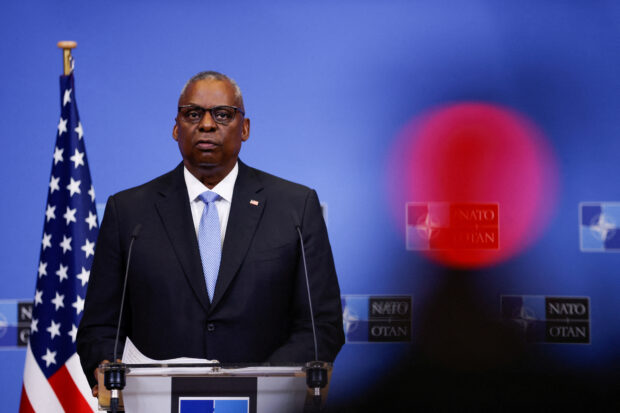Pentagon keeps Austin’s hospitalization under wraps for days

U.S. Defence Secretary Lloyd Austin speaks to the media during a NATO Defence Ministers’ meeting at the Alliance’s headquarters in Brussels, Belgium October 12, 2023. REUTERS PHOTO
WASHINGTON — US Defense Secretary Lloyd Austin has been hospitalized since Monday for an unspecified medical matter, the Pentagon said late on Friday, without detailing why he was being treated or why it kept his hospital stay secret all week.
Austin, who is 70, sits just below President Joe Biden at the top of the chain of command of the U.S. military and his duties require him being available at a moment’s notice to respond to any manner of national security crisis.
The Pentagon did not say whether Austin ever lost consciousness before or after he was admitted to Walter Reed National Military Medical Center on Jan. 1, or the extent to which his duties were assumed by his deputy, Kathleen Hicks.
Those duties include being ready and available to respond to an incoming nuclear attack.
The Pentagon said Austin suffered “complications following a recent elective medical procedure,” but declined to say what that procedure was or what complications he suffered.
“He is recovering well and is expecting to resume his full duties today,” Air Force Major General Patrick Ryder, the top Pentagon spokesperson, said in a statement on Friday.
Just a day earlier, Ryder held a televised news briefing that conveyed the sense of business as usual at the Pentagon, offering Austin’s condolences to ally Japan following its New Year’s Day earthquake, for example.
But the past week has been anything but normal for the Pentagon, with U.S. troops in the Middle East wrestling with the regional fallout from the unfolding Israel-Hamas war and carrying out a U.S. retaliatory strike in Baghdad on Thursday.
The Pentagon Press Association, in a letter to Pentagon officials, criticized the Defense Department’s secrecy, saying that Austin was a public figure who had no claim to medical privacy in such a situation.
“At a time when there are growing threats to U.S. military service members in the Middle East and the U.S. is playing key national security roles in the wars in Israel and Ukraine, it is particularly critical for the American public to be informed about the health status and decision-making ability of its top defense leader,” it wrote.
Reuters correspondent Phil Stewart is a member of the association’s board of directors.
The Pentagon Press Association letter noted that even U.S. presidents disclose when they must delegate duties due to medical procedures.
The way the Defense Department handled Austin’s hospitalization stands in contrast to how the State Department dealt with then-Secretary of State Colin Powell’s prostate surgery on Dec. 15, 2003.
The State Department spokesman at that time issued a statement in the morning making public that Powell, a retired four-star general and former chairman of the Joint Chiefs of Staff, was in surgery at Walter Reed Army Medical Center and would remain there for several days before returning home.
It also said Powell would be on a reduced schedule while he recovered from the operation. The State Department’s spokesman at the time, Richard Boucher, then offered details on Powell’s surgery in his daily briefing.
Boucher, contacted by Reuters on Friday, said the key question regarding public disclosure was whether Austin was under anesthesia or was incapacitated.
“Was there any moment in the process where he could not function as secretary of defense?” he asked. “If you are up and walking around and have your information and you have your aides in the next room and you can make split-second decisions … then there is probably not a public necessity to disclose.
“The only necessity is if you are going to be conked out,” he added.
The Pentagon has not yet answered that question.
RELATED STORY